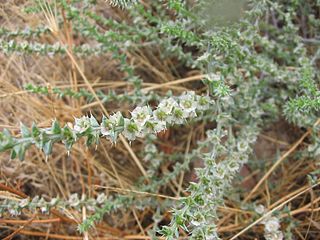
The Salsoloideae are a subfamily of the Amaranthaceae, formerly in family Chenopodiaceae.

Halogeton is a plant genus of the family Amaranthaceae. The genus name, Halogeton, derives from the Greek words for "salt" and for "neighbor."

Zygophyllum is the type genus of the flowering plant family Zygophyllaceae. The generic name is derived from the Greek words ζυγόν (zygon), meaning "double", and φυλλον (phyllon), meaning "leaf". It refers to the leaves, each of which have two leaflets. The genus is distributed in arid and semi-arid regions of Africa, the Mediterranean Basin, central Asia and Australia.

Salsola is a genus of the subfamily Salsoloideae in the family Amaranthaceae. The genus sensu stricto is distributed in central and southwestern Asia, North Africa, and the Mediterranean. A common name of various members of this genus and related genera is saltwort, for their salt tolerance. The genus name Salsola is from the Latin salsus, meaning "salty".

Halothamnus glaucus is a species of the plant genus Halothamnus, that belongs to the subfamily Salsoloideae of the family Amaranthaceae,. It occurs in Western and Central Asia.

Halothamnus auriculus is a species of the plant genus Halothamnus, that belongs to the subfamily Salsoloideae of the family Amaranthaceae,. It occurs in Western and Middle Asia.

The Suaedoideae are a subfamily of plants in the family Amaranthaceae.

Kali is a genus of plants in the subfamily Salsoloideae in the family Amaranthaceae. Common names of various members of this genus include tumbleweed for its wind-blown seed dispersal habit, and Tartar thistle and Russian thistle for its origins.

Anabasis is a genus of plants in the subfamily Salsoloideae of the family Amaranthaceae. It is distributed in southern Europe, North Africa, and Asia.
Haloxylon salicornicum is a shrub or undershrub belonging to the family Amaranthaceae. It is a desert shrub and is found in Israel, Jordan, Egypt, Saudi Arabia, Kuwait, Oman, United Arab Emirates, Afghanistan and Pakistan.

Caroxylon is a genus of shrubby flowering plants in the family Chenopodiaceae, found in drier areas of the Old World, including southern Africa, Madagascar, northern Africa, Mediterranean islands of Europe, the Canary Islands, Socotra, Ukraine, Russia, western Asia, Central Asia, India, western and northern China, and Mongolia.
Teloxys is a genus of flowering plants belonging to the family Amaranthaceae.
Tournonia is a genus of flowering plants belonging to the family Basellaceae.
Sevada is a genus of flowering plants belonging to the family Amaranthaceae.
Calicorema is a genus of flowering plants belonging to the family Amaranthaceae.
Cornulaca is a genus of flowering plants belonging to the family Amaranthaceae.
Henonia is a genus of flowering plants belonging to the family Amaranthaceae.
Holmbergia is a genus of flowering plants belonging to the family Amaranthaceae.
Kaviria is a genus of flowering plants belonging to the family Amaranthaceae.








